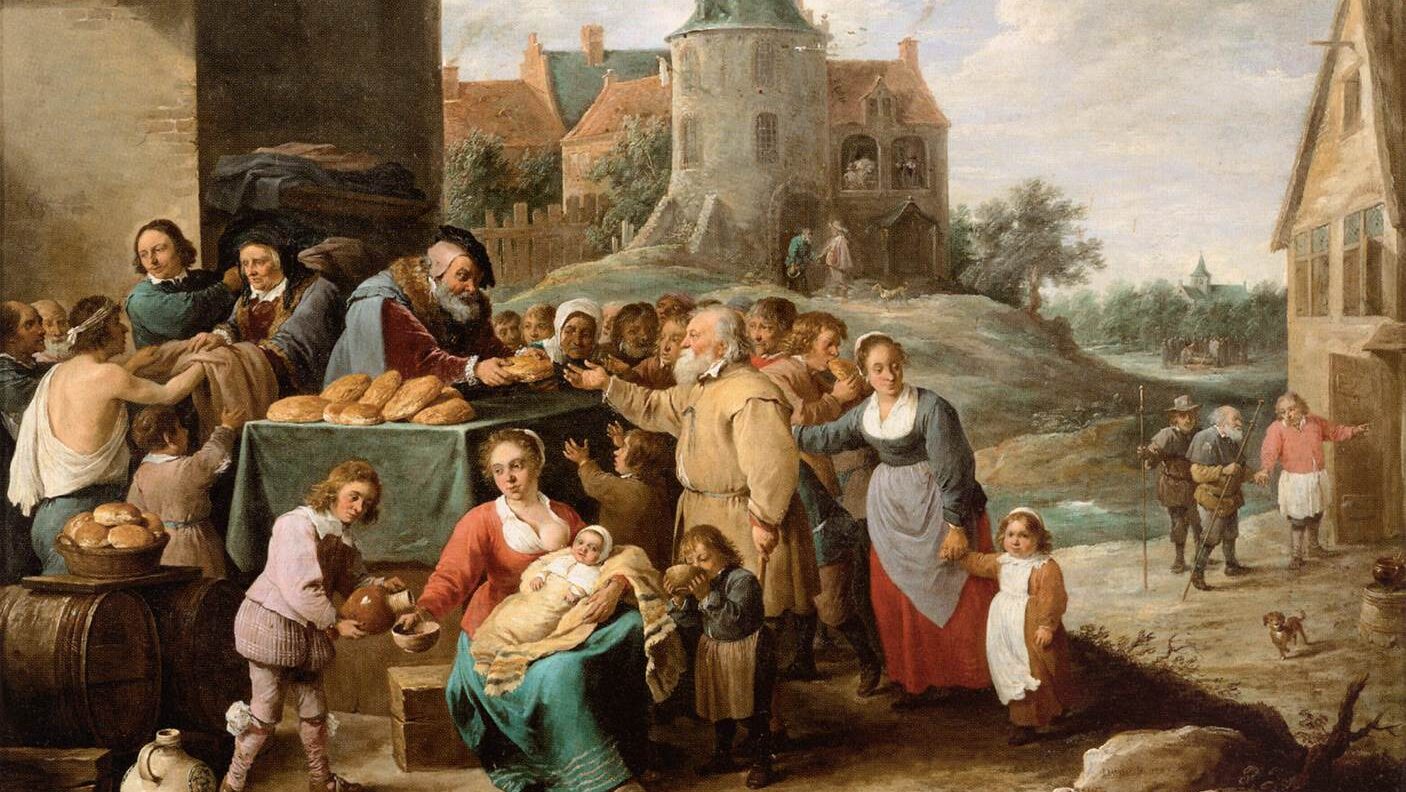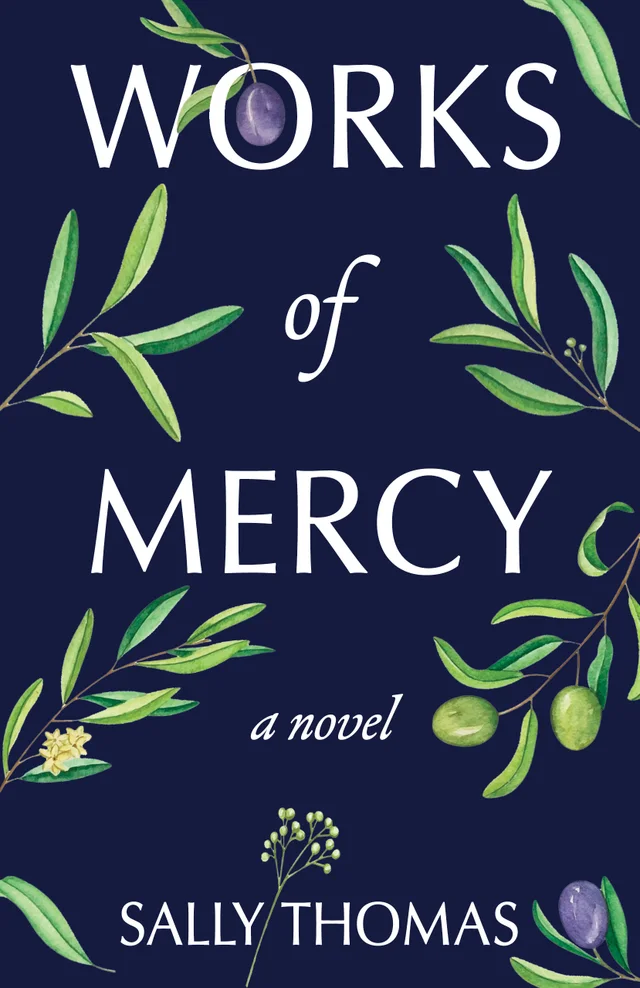
The Works of Mercy (1640s), a 57 x 77 cm oil on copper by David Teniers the Younger (1610-1690), located in the Louvre Museum in Paris.

It is easier than ever before to live a functioning life without really encountering other people. Self-checkout at the grocery store, Amazon Prime deliveries, movie streaming, telehealth appointments, virtual church services—the list could go on. These things are not bad in themselves; I have certainly benefited from the technology that allows me to get a prescription without dragging my sick children to the pediatrician’s office. But they can lull us, seductively, into a destructive sense of safety.
Many of us bemoan the lack of vibrant and supportive community in our neighborhoods and towns. But can we really have community without the discomfort of real, flesh-and-blood encounters with other people? Small talk with the grocery clerk, wrangling babies at Mass, listening to the man at the end of the row chew his popcorn too loudly at a movie matinee—this is all part of what it means to be human.
It is the discomfort of particularity that allows us to practice virtue, too. Consider when Christ lists the corporal works of mercy in St. Matthew’s Gospel: “For I was hungry, and you gave me to eat; I was thirsty, and you gave me to drink; I was a stranger, and you took me in; naked, and you covered me; sick, and you visited me; I was in prison, and you came to me.”
We cannot extend mercy to Christ in the least of our brethren if we cocoon ourselves away in comfortable, predictable lives that never allow us even to see them.
This tension between the Christian call to practice the works of mercy and the temptation to hold others at a safe distance lies at the heart of poet Sally Thomas’ debut novel, Works of Mercy, which was published by Wiseblood Books in 2022.
The novel’s heroine is Kirsty Sain, born and raised in the Shetland Islands, educated at Oxford, and now living in “a rural corner of the North Carolina Piedmont.” Miss Kirsty (as many of Annesdale’s residents call her) is a widow without any living children. She cleans the rectory once a week for the parish’s new pastor, Fr. Schuyler, a liturgical traditionalist who describes himself as “not really good with people.”
Kirsty takes comfort in the solitude of her life; it does not make any unseemly demands of her. Indeed, she reflects that she “preferred solitude to just about anything else.” Over the course of the novel, however, circumstances (and, no doubt, divine grace) conspire to draw her more and more into the lives of others in her community, from Fr. Schuyler to the loud and sprawling Malkin family to the tiny, hairless cat that ends up in her care.
It is with reluctance—and often from a sense of obligation—that Kirsty enters into their joys and struggles. She has an aversion (shared by many of us, I think) to “[getting] up other people’s business.” There is a vulnerability to helping others, just as there is to being helped. What if the sick don’t want to be visited? What if they’re embarrassed about the dishes piled up in their sink? What if the hungry judge the meal you brought them because you used sauce from a jar? What if the naked would rather not have anyone know that they have fallen on hard times?
Kirsty feels this vulnerability keenly as she prepares to visit the Malkins’ home, where the mother is on bedrest.
Visiting people, entering their homes, seeing how they lived, in their very presence: this was a level of intimacy I could, and did, perfectly happily live without. I might come to clean a house. I did not want to know the people who’d made the mess. The thought made me squeamish.
Returning home from this visit to the Malkins, Kirsty observes to herself that “having now visited the sick I felt that I had visited the sick, conclusively.” Later, after having failed to pay another call, she imagines, with a pang of guilt, Mrs. Malkin “waiting on her cracked couch, wanting to be intruded upon.”
Performing the works of mercy might not always make us feel good, but they’re not really about how we feel at all. It can be so easy to view them as cursory items on a checklist, points to be earned in order to unlock the gates of Heaven. But they’re not one-and-done. They’re a way of life—and one that holds as its goal the encountering and loving of real human beings whose needs and preferences might be different than our own.
The corporal works of mercy come to shape Kirsty’s days as she brings food to the Malkins, to Fr. Schuyler, and to Wylie Carpenter, a middle-aged man who takes on a son-like role in her life. Previously, she had cooked only out of a sense of self-preservation, finding no enjoyment in the preparation of food. But it quickly becomes a form of service.
The novel includes lengthy flashbacks as Kirsty reflects on her past—on the men and women who shaped her and who have gone on from this life. The reader sees her at some of her lowest moments. The hungry, the sick, the stranger—Kirsty has been all of these things in her life. It is now her turn to see Christ under these guises amidst her neighbors.
But these physical actions listed in the Gospel are not the only acts of mercy to which the Christian is called. After all, man does not live by bread alone. There are also seven spiritual works of mercy: admonishing the sinner, counseling the doubtful, instructing the ignorant, comforting the sorrowful, forgiving injuries, bearing wrongs patiently, and praying for the living and the dead.
Kirsty reflects explicitly on these spiritual works at one point in the narrative, as she spies Wylie Carpenter leaving Mass one Sunday morning. Wylie is described as “an enthusiastic Catholic” who “loved his neighbor, and … was fond of God” but wasn’t “regular in his observance of religion.” She approaches him in order to comment approvingly on his attendance: “To admonish the sinner is one of the Spiritual Works of Mercy, but I never had much taste for that. The best I could manage was to encourage the sinner when he did something right.” She sells herself short, though. As the novel progresses, she advises, encourages, and sometimes chastises—especially the young Fr. Schuyler, whom she prompts to care for his flock with greater attentiveness.
Comfort for the sorrowful and prayer, especially for the dead, are the novel’s primary examples of the spiritual works, however. Works of Mercy is, in many ways, a novel about grief.
As a student, Kirsty had been captivated by the poetry of St. Robert Southwell, S.J.—to the dismay of her tutor and lover Dermott, who derides her work as “a bit credulous.” Southwell knew sorrow well; one of the Forty Martyrs of England and Wales, he was imprisoned, tortured, and eventually hanged for his fidelity to the pope. Southwell’s most recognized poem is probably The Burning Babe, which showcases the way in which Christ’s incarnation brings together love and suffering.
My faultless breast the furnace is;
The fuel, wounding thorns;
Love is the fire, and sighs the smoke;
The ashes, shames and scorns …
Love and suffering are never far apart in the pages of Works of Mercy, and its characters are given ample opportunity to unite with Christ’s Passion. However, Thomas doesn’t simplify their pain or reduce them to examples of how Christians ‘ought’ to grieve.
Kirsty, who has said goodbye to almost everyone she has ever cared about, struggles with the feeling that she is not sorrowful enough for her losses. She asks herself, “[If] your grief was complicated by … the regret that you were not sadder than you were, because you had not loved very adequately what you had lost—what then?” She rests upon the conviction that this is a burden she will carry alone.
In the novel’s climactic scene (I am trying to avoid spoilers), another character turns to anger: at God, at what she has lost, and at the responses of others who are grieving as well. “[Love is] a goddamn sword through your heart,” she says.
Kirsty considers these words and concludes, “Yes, it was.”
To be frank, Works of Mercy was, at times, a very difficult read, emotionally and spiritually speaking. Kirsty hesitates to enter into the grief of others in her community, acknowledging that her instinct to “give them privacy in their grief” is perhaps “only the impulse of self-preservation.”
Like Kirsty, I possess an impulse of self-preservation, one that sometimes makes me enter into grief even in the pages of fiction. The real world can feel so heavy, rife with heartbreak, cancer, child labor, and war. Isn’t it enough that I have to encounter these things in the news?
Throughout the novel, Kirsty reflects upon one of Robert Southwell’s prose works, Mary Magdalen’s Funeral Tears. “Sorrow is the sister of mercy,” he writes, “and the maker of compassion.” Caring for others in their distress can be an emotionally fraught task. And yet we are called to it all the same. After all, refusing to encounter suffering doesn’t spare us from it.
Reading Works of Mercy, I am reminded of something that musician Nick Cave said, reflecting on the sudden and tragic death of his son:
In fact [grief] is ordinary, in that it happens to all of us at some time or another. We are all, at some point in our lives, obliterated by loss. If you haven’t been by now, you will be in time—that’s for sure. And, of course, if you have been fortunate enough to have been truly loved, in this world, you will also cause extraordinary pain to others when you leave it. That’s the covenant of life and death, and the terrible beauty of grief.
In practicing the works of mercy, we see Christ in the least of our brethren, and we look upon them with His eyes and with His love. But we are also afforded an opportunity for gratitude, to say, “There, but for the grace of God go I.”
And as Nick Cave’s words remind us, each of us is posed to be on both the giving and receiving ends of the works of mercy in our lifetimes. I know that I have been blessed by eating meals at others’ tables, by dressing my children in hand-me-down clothing, and by forgiveness from those whom I have wronged. Living a life of mercy means encountering the ‘least of these’ in all of their particularity—and recognizing them in ourselves, too.